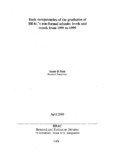Basic competencies of the graduates of BRAC's non-formal schools: levels and trends from 1995 to 1999
Date
2000-04Publisher
BRAC Research and Evaluation Division (RED)Author
Nath, Samir RanjanMetadata
Show full item recordCitation
Nath, S. R. (2000, April). Basic competencies of the graduates of BRAC’s non-formal schools: levels and trends from 1995 to 1999. Research Reports (2000): Social Studies, Vol – XXV, 185–221.Abstract
Based on the Declaration of the World Conference on Education held in Jomtien in
1990, BRAC designed an instrument to measure the level of basic education of
Bangladeshi children. The Research and Evaluation Division of BRAC regularly
monitors the performance of the graduates of BRAC's non-formal schools through
this instrument. This report presents the basic educational status of the graduates of
three cohorts of 1995, 1997 and 1999. Three independent samples were drawn from
three cohorts and the learners were tested after nine/ten months of their graduation.
The sample from 1995 cohort was also tested in 1997 and 1999; and the sample from
1997 cohort was tested in 1999. Children from three systems of BRAC schools were
assessed: those in Non Formal Primary Education (NFPE) and in Basic Education for
Older Children (BEOC) which was directly operated by BRAC, and NFPE under the
Education Support Programme (ESP) which are operated by other NGOs with support
from BRAC. The sample sizes for the three independent surveys were 1259 each.
Among the 1,259 graduates of 1995 and 1997 each, 812 of 1995 and 991 of 1997
could be traced in 1999; these are respectively 64.5% and 78.7% of the original
samples. Of the sample of 1995 graduates only 54.3% were common in all the three
surveys.

